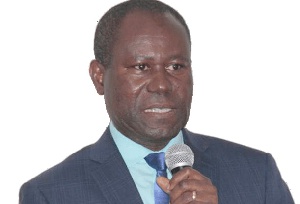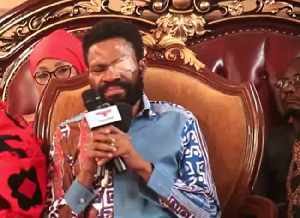CEO of Ghana Cocoa Board (COCOBOD), Joseph Boahen Aidoo has said the activities of artisanal miners (galamseyers) and the aging of farmers are affecting the cocoa industry in Ghana.
Delivering a keynote address on the theme: ‘Accelerating sustainability through technology and innovation’, at the 2017 WCF Partnership Meetings in Washington, Mr Boahen Aidoo said “there is a vibrant land market patronised by the illegal artisanal miners (popularly called galamsey operators in Ghana) at Sefwi Boako which is known for its sedimentary gold ore deposits.”
He said local farmers like “an obviously despondent-looking Kwasi Oti was found at the crossroad of selling his landed property to ever cash-ready galamsey operators or holding onto his 5 ha cocoa farmland and continue to wallow in poverty.”
Mr Boahen Aidoo said: “The horrible ravage that galamsey has caused Ghana’s forests, environment and water resources in the past ten or so years is a narrative that must not be entertained. The challenge then is how we incentivise Kwesi Oti to raise the family’s income from cocoa cultivation without compromising his children’s ability to utilise the same land for their future benefit.
This would require remunerative prices and productivity enhancing initiatives at a rate that maintains a desirable demand-supply balance.”
The Akufo-Addo government, he said, is “tackling this challenge head-on. The aging population of our cocoa farmers and the onslaught of galamsey put the future of Ghana’s cocoa industry at risk. It is to partly address these problems that COCOBOD has resorted to efficiency and productivity-enhancing interventions.
“The first that quickly comes to mind is hand pollination. Results from the pilot programme across the country have been satisfactory and generated a lot of enthusiasm amongst the cocoa farmers. We are going to scale up the programme this 2017/18 crop year. In addition, we have expanded cocoa extension coverage. We have opened discussions with our partners to expand the use of ICT in cocoa extension.
“The next is irrigation. Climate change mitigation is a priority in the productivity enhancement agenda. There are two cocoa flowering seasons in Ghana. One coincides with the rainy season, the other occurs during the dry (Harmattan) period. Because of lack of soil moisture during the Harmattan, most of the flowers drop. This accounts for what is called the light crop and the smaller sizes of the beans. To optimise farm yield and improve upon bean sizes, we have started piloting small scale irrigation. This will also be scaled up next year.”
Read Mr Joseph Boahen Aidoo’s full statement below:
“ACCELERATING SUSTAINABILITY THROUGH TECHNOLOGY AND INNOVATION”
A KEYNOTE ADDRESS DELIVERED BY HON. JOSEPH BOAHEN AIDOO, CHIEF EXECUTIVE OF GHANA COCOA BOARD AT THE 2017 WCF PARTNERSHIP MEETINGS IN WASHINGTON 24TH OCTOBER, 2017
All protocol observed,
Ladies and Gentlemen
I have been in office for nine months. I have met quite a number of you respected and distinguished actors of the cocoa fraternity. We have walked the paths of the industry together, and on the way, I have been privileged to chat and exchange ideas and experiences with you. Still, I measure myself new in the industry.
On that score, for me to be called upon to present a keynote address as I debut at this auspicious Partnership Meeting of the World Cocoa Foundation (WCF) is a great honour but a challenge too. I appreciate the honour. I am grateful to Chairman Parkin and President Scobey. And I do accept the challenge.
Among all actors of the cocoa economy; from the grassroots and district levels, to national platforms and international fora, is a common thread, which illuminates a common course, with one common value, one shared vision, and one goal – and that is, sustainability!
Ladies and Gentlemen, the long-term sustainability of the cocoa value chain is a shared global responsibility. There is a growing international cooperation and understanding to the effect that, the cocoa industry needs to maintain productivity and profitability at levels that are socially acceptable, economically viable and environmentally friendly.
Thus, the attainment of a sustainable cocoa economy has become a predominant objective of all stakeholders. Meanwhile, perspectives on what it means, the best path to its attainment, and the level of commitment to achieving it differ among stakeholders. This, perhaps, is one of the grand challenges in cocoa sustainability.
To consumers, sustainability emphasis is on ethical issues and environmental protection. For manufacturers and grinders, all efforts at sustainability must imply continuous and profitable sourcing. To us producers, a decent price that enables farmers to live a life of dignity, a price that is capable of attracting and maintaining the next generation of cocoa farmers, is the underlying meaning of sustainability.
In spite of these differences, we have a common denominator of ensuring a thriving cocoa economy, one that presents optimal benefits to all stakeholders without compromising future opportunities. It is in this respect that I congratulate the WCF on becoming the largest non-governmental platform, on which governments, civil society, and the private sector engage on the shared agenda of a sustainable cocoa economy. I especially like to thank Chairman Parkin and President Scobey for working tirelessly on this.
Reflecting on the theme of this Session, on board the flight to Washington, I remembered my interactions with cocoa farmers in the early part of this year. One farmer comes in mind – Opanin Kwasi Oti, at Sefwi Boako, in the cocoa heartland of Ghana. Kwasi Oti is like any typical Ghanaian cocoa farmer – 55 years old, with 5 hectares of farm, 5 children and harvesting a total of 30 bags of cocoa annually. At his current state, none of his children above the age of 17 is interested in their father’s occupation. Kwesi Oti is facing an increasing unpredictable climate, rising labour cost, low international prices resulting in low producer price and part of his farm has been affected by the cocoa swollen shoot virus disease (CSSVD).
The annual income of cocoa is not enough to cater for the Oti family. Meanwhile, there is a vibrant land market patronised by the illegal artisanal miners (popularly called galamsey operators in Ghana) at Sefwi Boako which is known for its sedimentary gold ore deposits. An obvious despondent-looking Kwasi Oti was found at the crossroad of selling his landed property to ever cash-ready galamsey operators or holding onto his 5 ha cocoa farmland and continue to wallow in poverty.
The horrible ravage that galamsey has caused Ghana’s forests, environment and water resources in the past ten or so years is a narrative that must not be entertained. The challenge then is how we incentivize Kwesi Oti to raise the family’s income from cocoa cultivation without compromising his children’s ability to utilise the same land for their future benefit. This would require remunerative prices and productivity enhancing initiatives at a rate that maintains a desirable demand-supply balance.
Mr. Chairman, do we have the required knowledge, resources and partnerships that can transfer cost-effective technologies and innovations necessary for raising productivity of smallholders? Do we have the collective capacity to help Kwesi Oti to adapt and mitigate adverse effects of climate change? Together, do the partners gathered here have the collective ability to raise demand for cocoa? Can our initiatives and projects lead to living incomes from cocoa for likes of the Oti family?
The answers to these questions are right here in Washington. President Obama in 2008 provided one answer to overcoming every single challenge of this world – yes we can! And, indeed, the stakeholders gathered here know deep in your hearts that YES, WE CAN!
In Ghana, we are tackling this challenge head on. The aging populating of our cocoa farmers and the onslaught of galamsey put the future of Ghana’s cocoa industry at risk. It is to partly address these problems that COCOBOD has resorted to efficiency and productivity-enhancing interventions.
The first that quickly comes to mind is hand pollination. Results from the pilot programme across the country have been satisfactory and generated a lot of enthusiasm amongst the cocoa farmers. We are going to scale up the programme this 2017/18 crop year. In addition, we have expanded cocoa extension coverage. We have opened discussions with our partners to expand the use of ICT in cocoa extension.
The next is irrigation. Climate change mitigation is a priority in the productivity enhancement agenda. There are two cocoa flowering seasons in Ghana. One coincides with the rainy season, the other occurs during the dry (Harmattan) period. Because of lack of soil moisture during the Harmattan, most of the flowers drop. This accounts for what is called the light crop and the smaller sizes of the beans. To optimize farm yield and improve upon bean sizes, we have started piloting small scale irrigation. This will also be scaled up next year.
Ladies and Gentlemen, cocoa production and sustainable forest management are closely linked and strongly influence each other. The challenge in this regard is how to take advantage of the agro-forestry practices of cocoa cultivation that support afforestation. The objective of Ghana Cocoa Board is to drive a resilient and robust cocoa sector that increases economic opportunities for our farmers, without compromising the integrity of our existing forests.
In this respect, we have intensified our campaign for cocoa agroforestry and organic cocoa farming. Because of the profound negative effect of the use of herbicides and weedicides on soil microbiology and biodiversity we have made it a policy to return to weeding, but of course not manual weeding. COCOBOD in partnership with the private sector will soon introduce motorised slashes for weeding and motorized pruners for the pruning of cocoa trees and removal of mistletoes.
Next is incentivizing in the farm rehabilitation programme. The programme involves cutting the unproductive diseased and overaged cocoa trees for replanting. The programme achieved little results in the past despite the supply of free seedlings to farmers because the intervention overlooked two critical issues, namely, the loss of household income and security of land tenure.
Note, this is not a local problem. Cote d’Ivoire faces same. The two countries have jointly put in a request for funding from the African Development Bank. The sooner the funding, the better for Ghana, else I am afraid we may lose a sizeable amount of our cocoa farmland to galamsey.
The foregoing clearly demonstrates that COCOBOD has packaged interventions that basically aim at enhancing efficiency and productivity of the Ghanaian farmer. This is being done not only to discourage farmers from selling their farmlands but it is also meant to make cocoa farming a lucrative venture and attractive to the youth.
Ladies and Gentlemen. You would agree that the effectiveness of all the productivity enhancing initiatives enumerated so far cannot pass the test without a sustainable market – that is, a sustainable demand and a sustainable price.
Therefore, the drop in cocoa prices must be of concern to all stakeholders, as it directly impacts the sustainability of the cocoa value chain. Particularly with the projection that prices may remain low in the medium term, the sustainability of cocoa production is approaching a threshold. Any talk of hope in cocoa farming to the adult children of the Oti family in Ghana will amount to telling it to the marines.
This price trend has to be reversed.
The global cocoa and chocolate trade has been growing. In fact, in 2016, the combined net sales of the top four cocoa processing companies in the world was almost twice the combined GDP of Ghana and Cote D’Ivoire, who produce 60% of the world’s cocoa. But the question is, what is required for all the expanding global and domestic trade, processing and value addition in cocoa to result in the economic empowerment of producers? I believe industry experts herein gathered will have thoughtful answers to this question. But I will focus on one thing. Price!
Prices are the best fertiliser for improving livelihoods. Cocoa prices send signals to farmers as to the amount of time and labour to invest in cocoa production. Thus, low prices constitute a major threat to the sustainability of the industry.
Ladies and Gentlemen, the recent price drop is viewed generally as an issue of over-production. Producers are therefore expected to manage their side of the Demand-Supply balance by reducing the quantity of cocoa presented on the world market. It must however be noted that cocoa production is not easily amenable to control in the short-to-medium term, as the case may be with oil and other industrial production processes.
As partners in the global cocoa economy, we have the responsibility to spearhead all efforts in addressing the underlying factors responsible for the recent price trends which put the life of the cocoa farmer in great jeopardy. I, therefore, charge members of the global cocoa fraternity here gathered, whether as producers, processors, manufacturers, bankers, financiers, speculators, hedgers, concerned CSOs, NGOs, or consumers of cocoa to help use our positions and resources to address this concern.
We need to collectively work towards increasing demand to establish the desired equilibrium in the market. One key activity in this regard is the promotion of cocoa consumption. Foremost, we have to stimulate consumption in the conventional markets of North America and Europe, generate same in the untested markets of Africa, and step up promotion in the emerging markets of Asia. Just imagine 5% of Chinese and Indians taking 10 grams of cocoa products daily. The direct impact on the entire value chain will be revolutionary. Hence our shared agenda on cocoa sustainability must focus and pursue such cause.
The development of new markets must be high on the agenda. This cannot be achieved if we continue to promote consumption in the conventional way – that is in the form of sweetened chocolates only. We may continue to target children and younger consumers with sweets, but adult populations require different products. Concerns about sugar, milk, calories etc. are stagnating demand, especially in traditional chocolate markets.
Ladies and Gentlemen, it is apparent that the cocoa industry has not done enough to highlight the health benefits cocoa provides its consumers. It is common knowledge that dark chocolates with high concentration of cocoa solids contain more health-boosting flavonoids – those potent antioxidants which protect cells against damage from free-radicals. Flavonoids are said to help protect the body against diseases associated with oxidative stress such as cardiovascular diseases, diabetes and cancer, build bone mass, enhance cognitive performance and are aphrodisiac. These are all concerns that people who are forty years and above often grapple with. I am talking about the very health problems that cocoa addresses, and the very people who have the purchasing power to buy cocoa. So what are we waiting for? The Health benefits of cocoa must therefore be told.
I strongly believe that the renaissance of cocoa consumption is here with us now; let us all rise to the occasion and stimulate cocoa consumption by way of promoting innovative cocoa products, - innovative products extending beyond chocolate bars and cosmetics, to cocoa beverages and others that can broaden the consumption base.
As beverages, tea and coffee come to the table alone as ground roasted coffee beans or roasted tea leaves. The decision to add milk or sugar and in what amounts is optional. It is a decision of the consumer. Let us promote cocoa the same way. As a beverage, let it appear as ground roasted cocoa beans and leave the decision of sugar and milk to the consumer to let cocoa demonstrate its own health powers to the world.
Chocolate which has been the flagship of cocoa is losing grounds in the conventional markets. Gradually and steadily cocoa butter equivalents (CBEs) are being pushed to displace cocoa in chocolates knowing very well that what cocoa can accomplish the CBEs cannot match. This is a great worry to us producers.
It is a market trite that whereas the price of cocoa has drastically declined on the international market, the proportion of cocoa content in chocolates have either remained the same or reduced in the name of CBEs. The bar of chocolate has also remained the same or shrunk in relative price terms. There cannot be sustainability in the global cocoa economy if consumers continue to be short-changed this way.
We must admit that if consumer health consciousness is telling on the chocolate market in North America and Europe, it is not because of the cocoa content in it; it is because of the sugar and the calories. The worse affected are the adults and the aged, who rather need cocoa most. I, therefore, challenge our processors and manufacturers to come out with innovative chocolates and cocoa products that address the needs and the taste of everybody- the young and the old.
Charity, it is said, begins at home. Therefore, we in Ghana have re-launched our campaign to promote local consumption of cocoa products. The responsibility is on us to help develop the local market for cocoa to promote the health benefits of cocoa which are essential for children, the young, the adult and the aged.
Before I take my seat, I will like to reiterate my earlier position that the long-term sustainability of the cocoa value chain must be a collective effort of all actors – producers, suppliers, regulators, traders, manufacturers and consumers alike. Since we all recognise and acknowledge that Opanin Kwasi Oti and his ilk are the most disadvantaged in the value chain, it behoves all of us to adjust our positions to enable them continue to play effectively their pivotal role.
Mr. Chairman, Ladies and gentlemen, the future of the cocoa industry looks bright and holds many prospects for sustainable cocoa economy in the years ahead. Partnership and innovation are what are key to enable us play our role effectively as the producers of cocoa in the world. And I am optimistic that WE CAN!
Thank you for your attention.
Business News of Monday, 6 November 2017
Source: classfmonline.com













